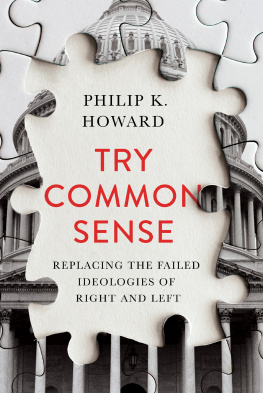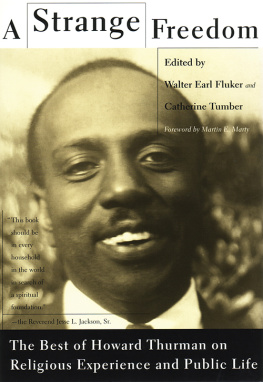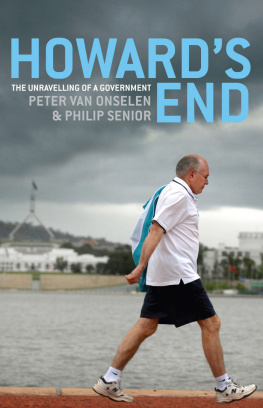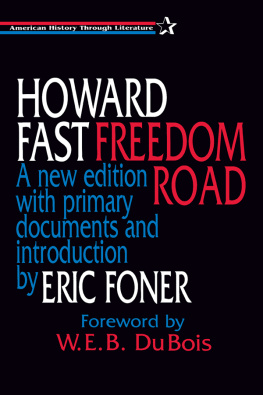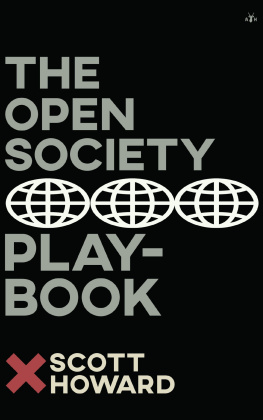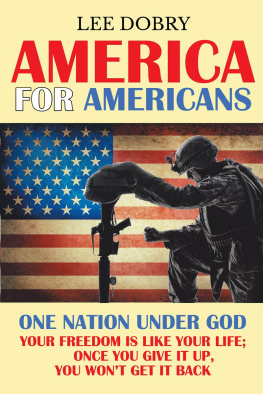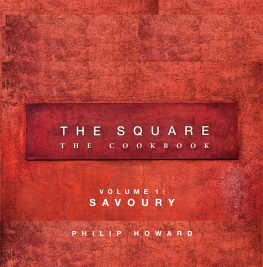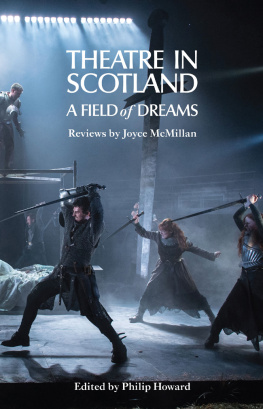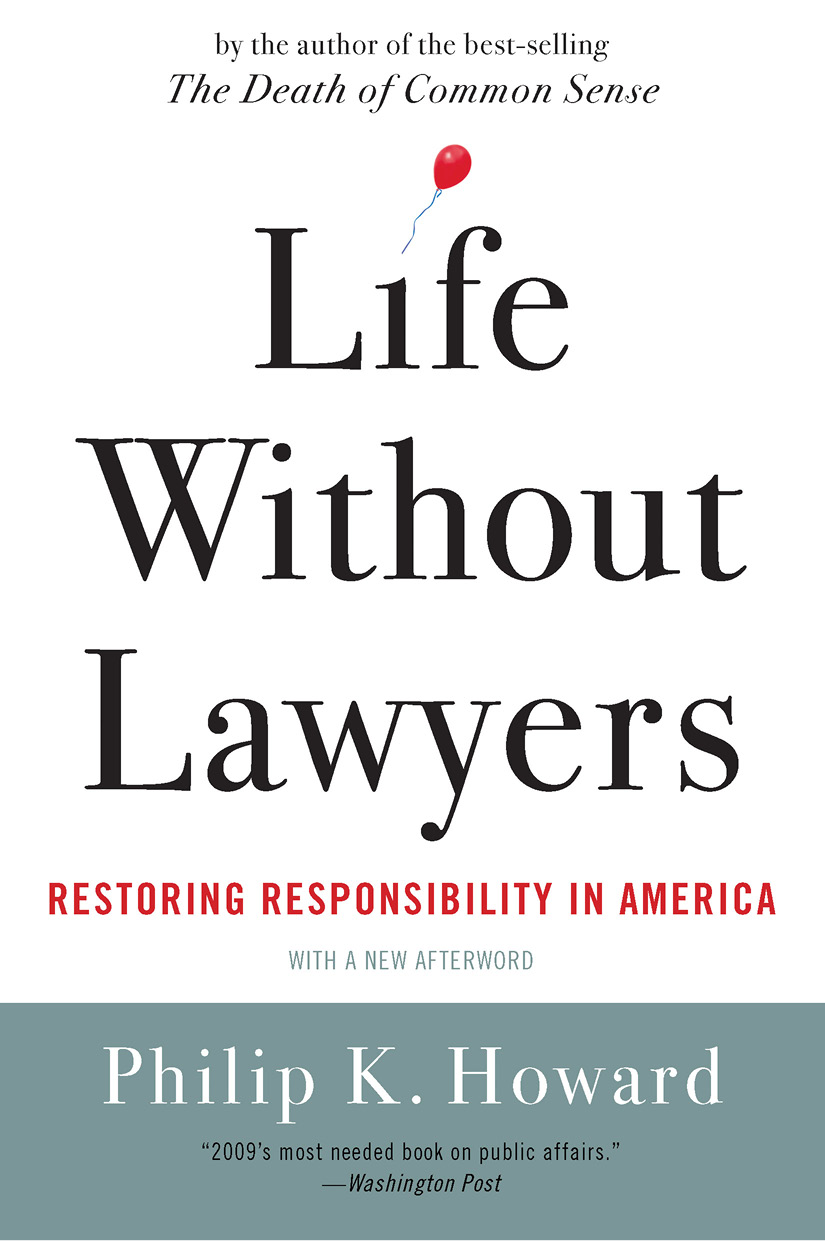
ALSO BY PHILIP K. HOWARD
The Death of Common Sense: How Law Is Suffocating America
The Collapse of the Common Good: How Americas Lawsuit Culture Undermines Our Freedom
LIFE WITHOUT LAWYERS

RESTORING RESPONSIBILITY
IN AMERICA
PHILIP K. HOWARD

W. W. NORTON & COMPANY
New York * London
For Alexandra,
and for Olivia, Charlotte, Lily, and Alexander,
who can make anyone an optimist
CO NT ENTS
INTRODUCTION
S ometimes I wonder h ow it came to this, a teacher in Wyoming told me, where teachers no longer have authority to run the classroom and parents are afraid to go on field trips for fear of being sued. Thomas Jefferson might have the same question. How did the land of freedom become a legal minefield? Americans tiptoe through law all day long, avoiding any acts that might offend someone or erupt into a legal claim. Legal fears constantly divert us from doing what we think is right. A pediatrician noted that I dont deal with patients the same way anymore. You wouldnt want to say something off the cuff that might be used against you.
Living in a free society is something we take for granted. After all, were free to live and work where we choose. Civil libertarians are vigilant to keep government from abusing its authority. But freedom should also include the joy of spontaneity, the power of personal conviction, and the authority to use common sensefor example, to maintain order in the classroom, and to interact honestly with a patient or a co-worker.
The idea of freedom as personal power has been pushed aside in recent decades by a new idea of freedomwhere the focus is on the rights of whoever might disagree with a decision. There were good reasons why we went in this direction, but now the momentum has carried us to a point where we no longer feel free in daily interaction. Almost any encounter carries legal risk. Lawyers are everywhere, both literallythe proportion of lawyers in the workforce almost doubled between 1970 and 2000and in our minds, sowing doubt into ordinary choices. Americans increasingly go through the day looking over their shoulders instead of where they want to go.
Whats been lost is a coherent legal framework of right and wrong. A free society requires that people generally understand the scope of their freedoms. Without reliable legal boundaries, distrust will infect daily dealings. People start to fear each other, and they start to fear law. Thats whats happened in America, particularly for teachers, doctors, managers, and others with responsibility.
Ive written about how aspects of modern law undermine our freedoms, but diagnosing the flaws of the current system, Ive learned, is not sufficient to stimulate change. In The Death of Common Sense , I described how detailed regulation functions like central planningcausing Mother Teresa to abandon plans to build a homeless shelter in the Bronx, for example, rather than waste money on a code-mandated elevator that no one would ever use. In my second book, The Collapse of the Common Good , I described how Americas lawsuit culture has injected defensiveness into daily relations. The town of Oologah, Oklahoma, dismantled the double slide in the central square, the joy of children for more than fifty years, after a minor injury prompted fears of future liability. I was gratified that leaders in the White House and state capitols endorsed the message of these books, and even undertook some important reforms. On the whole, however, the status quo has proved more powerful than the frustrations.
In 2002, with the support of leaders such as Bill Bradley and Tom Kean, a group of us formed a nonpartisan organization, Common Good (www.commongood.org), with the goal of restoring reliability to American law. Common Good has succeeded in bringing broad coalitions together behind new authority structuresfor example, an expert administrative court to handle malpractice claims, developed in a joint venture with the Harvard School of Public Health. Common Good is also working to design and pilot a new system of discipline for New York City schools, jointly with the United Federation of Teachers and the citys Department of Education. What we are learning with Common Good is the power of a new vision. Frustrated people are happy enough to complain, but to support change people need to see where theyre going.
In this book I present a vision for a new authority structure for America in which people are free to make daily choices. Judges aspire to keep lawsuits reasonable, understanding that what people can sue for ends up defining the limits of freedom. Schools are run by the instincts and values of the humans in charge, not organized like a bureaucratic assembly line. Public choices aspire to balance for the common good, not, generally, to appease someones demand for individual rights. Washington undergoes a hundred-year cleaning, to restore transparency and accountability. Democracy cant function if Washington is weighed down by decades of accumulated law, beyond the influence of anyone except special interests that scurry around the baseboards making sure nothing ever changes.
The proposal here is based on one overriding principle, which is this: Nothing worksnot health care, not schools, not democracy, not our relationship to children, not personal fulfillmentwithout the freedom to exercise judgment on the spot. The power of humans must be released. Individual attributes like willpower and character must be allowed room to flourish. People need freedom to take responsibility. Accountability should be based on accomplishment, not bureaucratic conformity. We must embrace human differences, not try to stamp people out of the same legal mold. Each individual, management expert Chester Barnard observed, is a single, unique, independent,... whole thing. I propose to pull law back from daily choices and give people the freedom to be themselves, drawing on their personal energy, instincts, and values. Many will succeed. Some will not. But the current overlegalized system, to varying degrees, drains us of the powers needed for accomplishment. The effects ripple through society, and virtually guarantee the failure of public institutions. Barack Obama energized the country with his campaign themeYes We Can! Visit any school, hospital, public agency, or other organization that deals with the public, however, and the dominant theme is not Yes We Can but No You Cant.
This book, in eight chapters, will describe how to rebuild coherent legal boundaries to restore our freedom to make sense of daily choices (Chapter 1); these boundaries define reasonable risk (Chapter 2), restrict the role of rights (Chapter 3), draw the limits of lawsuits (Chapter 4), liberate teachers and others from bureaucracy (Chapter 5), restore personal accountability (Chapter 6), revive public responsibility in Washington (Chapter 7), and make room for leadership at every level of society (Chapter 8).
Every thirty years or so America has had a basic shift in social structure. The last one was the rights revolution in the 1960s, when America faced up to racism and other forms of discrimination. Reaching back in history, there was the New Deal in the 1930s, creating social safety nets; then the Progressive era around 1900, ending laissez-faire and instituting regulation of industrial America; then the Civil War in the 1860s, abolishing slavery; then Jacksonian democracy in the 1830s, instituting populist rule; then the Republicans taking over from the Federalists just after 1800; then the American Revolution in 1776. Were overdue for a shift. The new structure will fix the excesses of the rights revolution and its false idea that law and rights can substitute for human judgment in daily dealings. Pulling law back into coherent boundaries will liberate each of us to make a difference, and allow Americans to come together to meet the challenges of our time.
Next page

